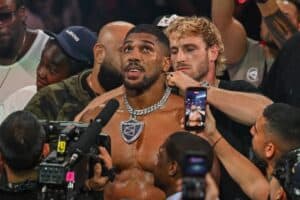South Africa's most illustrious boxer died at 9.50pm on Thursday, December 5 at the age of 95.

Nelson Mandela was credited to be a promising amateur heavyweight prospect before he turned his attention to saving the world of injustices and becoming what more than a few considered the Man of the 20th Century.
Almost eerily, only a couple of days later, Baby Jake Matlala, one of the late South African president’s most liked and admired boxers, died at the age of 51 of what was reported to be recurring tuberculosis.
The engaging Matlala was a phenomenon of sorts in his own right while standing at only 1.47 metres and being credited as the shortest ever boxing world champion.
He won four flyweight and junior flyweight world titles – a couple of them via less-recognised boxing organisations – and retired at the age of 40 after winning 53 of his fights and losing 13.
Early in his career, he lost on four successive occasions against a boxer who was no world-beater but, by the time he retired, he was able to account for such accomplished champions as Michael Carbajal, Pat Clinton and Paul Weir.
Also passing away during 2013 among the string of South African professional boxers was popular heavyweight contender Johnny du Plooy, who had some of the aura of Rocky Balboa in the popular Hollywood movie series, as well as Enoch Nhlapo.
Meanwhile, South African boxing lived on without much of the widespread popularity and appeal it had enjoyed during previous generations, in spite of boasting a number of world-class fighters.
A damning indictment in this respect was the fact that IBF flyweight champion Moruti Mthalane went the entire year without fighting once, through no fault of his own.
A prime reason for this was the shortage of finance and the rand-dollar exchange made it difficult for promoters to lure top fighters to these shores.
The result was that many of those imported were accompanied more by an excessive amount of boxing ballyhoo than any genuine class.
With Mthalane an enforced non-combatant – he is due to finally defend his IBF title in Thailand in January – the outstanding South African boxer to emerge in 2013 was Simpiwe Vetyeka, who earlier in December added the WBA featherweight title to the IBO belt he had won three months earlier.
In beating Indonesia’s legendary Chris John for the WBA title on a seventh-round tko, he ended his opponent’s unbeaten record of 51 fights without a defeat over 12 years and, what is more, sent him into retirement.
Vetyeka, in the process, became one of a handful of current boxing dual-champions and the first South African to scale this height in more than a decade.
Along with Mthalane, he is now only one of two South Africans to hold a title of one of boxing’s four premier boxing organisations, the WBA, the WBC, the IBF and the WBO.
Not far off in stature, behind Vetyeka and Mthalane, is current IBO strawweight champion Hekkie Budler, who was the most active among the South African top-liners with a narrow, somewhat controversial victory over 2012 leading pound-for-pound fighter Nkosinathi Joyi among his scalps.
A measure of Budler’s repute is the fact that he is rated number two strawweight in the world by the authoritative Ring Magazine, whose ratings are often deemed to be more accurate and unbiased than those of the sundry controlling organisations.
Ring also has challenger Jeffrey Mathebula at three among the world’s junior featherweights; Vetyeka fifth-placed featherweight; Zolani Tete fifth among the bantamweights; Mthalane down to seven in the flyweight division because of his inactivity; IBO champion Thomas Oosthuizen the eighth-ranked super middleweight and Joyi at 10, after moving up a division to junior flyweights.
In all, eight South Africans hold world titles: Vetyeka (WBA and IBO featherweight); Mthalane (IBF featherweight); Budler (IBO strawweight); Oosthuizen (IBO super middleweight); Chris van Heerden (IBO welterweight); Thabo Sonjica (IBO junior featherweight); Zolani Marali (WBF junior welterweight) and Danie Venter (IBF cruiserweight).
South Africans were also involved in 15 “world” labelled title fights, winning nine of them and losing six.
It is ironic that Venter, who was over-shadowed by the exciting Thabiso Mchunu in last year’s Super Eight cruiserweight contest at Emperors Palace, is now an WBF champion and the boxer hailed as “The Rock” is not.
Mchunu, however, achieved one of the most noteworthy victories of the year by a South African boxer when he out-fought former heavyweight title contender Eddie Chambers to gain recognition and respect in the US.
Oosthuizen, in contrast, hailed as the coming Golden Boy of South African boxing in his first years as a professional, blotted his copybook in 2013 with a couple of uninspiring performances, in spite of holding onto his IBO title.
Weight problems appeared a recurring worry for him and one of the big questions in South African boxing right now is whether the boxer, nicknamed “Tommy Gun”, returns to favour – or his decline continues in 2014 as he fires blanks.
With the boost of decisive sponsorship from Emperors Palace and broadcasters SuperSport, Golden Gloves were the dominant South African promoters in 2013, but it was a reflection on the sport as a whole that the organisation’s boss, Rodney Berman, had to go to Monte Carlo to be associated with his biggest events.
Without incurring the damning revelations of 2012 from a government-appointed judicial enquiry, Boxing SA did little in 2013 to fulfil its promise of a new deal.
Former Sports Minister Ngconde Balfour stepped down from his position at the helm of boxing’s controlling body, while Loyiso Mtya continued in his role as CEO.
– Sapa
Support Local Journalism
Add The Citizen as a Preferred Source on Google and follow us on Google News to see more of our trusted reporting in Google News and Top Stories.






